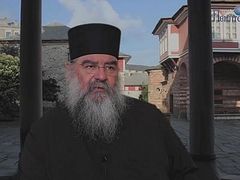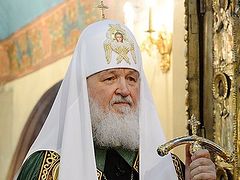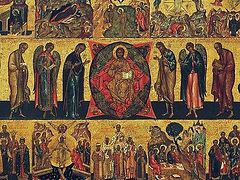Holiness seems like something unattainable to us, but it is found in love. We spoke about the skills and techniques of the workshops of holiness, as monasteries have been considered since ancient times, with their modern inhabitants, on Mt. Athos, in the Russian hinterland, and in the center of Moscow.
They’ll tell us that holiness is a rare gift and that it’s only an exception to the general order of Christian life, and that our times are especially scant of saints. And it’s true. But not because that’s how it’s supposed to be—it’s just that, in spite of the gift, we are not what we are called to and intended to be… Having united ourselves spiritually by faith and grace with the first Holy Man—Christ, Christians receive holy strength from Him to lead a holy life. The God-Man Christ gave you the power to be like Him, says St. John Chrysostom. Don’t be afraid when you hear this—it’s frightful to not be this way.
Archbishop Alexei (Frolov)
“It’s good to speak with the Lord in your heart”
Schemamonk Ilarion, abbot of the Cell of St. Charalambos of New Skete on Mt. Athos:
—Fr. Ilarion, all of us Christians are called to holiness: Be ye holy, says the Lord, for I am holy (cf. 1 Pet. 1:16). How can we become holy?
—I know that only the Lord makes us holy. A saint is one who lives according to the laws of God. When they told the Lord: Then one said unto Him, Behold, Thy mother and Thy brethren stand without, desiring to speak with Thee (Mt. 12:47)—how did Christ respond? And He stretched forth His hand toward His disciples, and said, Behold My mother and My brethren! For whosoever shall do the will of My Father Which is in Heaven, the same is My brother, and sister, and mother (Mt. 12:49-50).
We are one family with Jesus, with the Mother of God, if we live according to the Gospel. We are the blood brothers of Christ, and we are holy to Him. The Eucharist is at the center of our lives, and it is always a Paschal experience of forgiveness and love. “And when thou drunkest the Divine Blood unto communion, first be reconciled to them that have grieved thee…”
I remember how our Elder Charalambos, a spiritual child and disciple of Elder Joseph the Hesychast, would gather all of us his disciples before bringing the chalice out. “Let’s have Pascha today!” he would say. “Yes, let’s have Pascha,” we would agree, and we would all kneel down. He would open the curtain, read the prayer of absolution over us, and we would all commune.
—How can we preserve holiness after Communion?
—Just because you communed doesn’t mean you became a saint. What do we read in the prayers for Holy Communion? “For Thou art a fire, consuming the unworthy.” When we commune, Christ is within us, we feel this, and only in this way can we share in His holiness. His “holiness,” which means eternal life, does not exist within us. But we are granted participation, which depends on how worthily we partook. You are called only to become like Christ—you are given His image in the Gospel, and you are given the strength to do this in Communion.
—Vladyka Mark (Arndt) says that in Communion we only receive a kind of assignment in advance, which we must then realize in communion with others.
—There is no “I” in Christianity—there is “we.” We are all one in the experience of the Eucharist. How close we are to one another is verified then. When the Lord was tempted: Who is my neighbor? (Lk. 10:29), do you remember how He responded?
It is good to speak with the Lord in your heart, to accept every person as being sent to you by Christ. When you speak with your brother or sister, how much do you open your heart? Can you at least smile at the person who came up to you and quietly and peacefully answer his questions?
—How does the holiness of God reveal itself in our days?
—Saints are canonized in the Orthodox Church after their death, but holiness can be unmistakably identified in their lifetime by love.
It is love, and nothing else in this world, that can show us holiness. If we truly have holiness in our hearts, then we won’t be able to hurt another.
The Lord has commanded: Love one another; as I have loved you (Jn. 13:34).
—He loved us with a crucified love—that is, he took wounds upon Himself…
—And He tells us: Fear not (this call comes up most often in the Gospel). They reviled Him, called Him a demoniac, mocked Him, crucified Him… He prayed on the Cross (cf. Lk. 23:34). His words are an answer for us to all the evil caused to us, to the glory of God.
Otherwise, have we left prayer to start a career?, as Elder Jonah in Odessa lamented to me. The apostles transmitted their faith and changed the world, not because they were highly-educated people. None of these simple fishermen had studied in any institutes. They simply lived according to the commandments of God—and that’s it! They professed what they heard, saw, and felt (cf. 1 Jn. 1:1).
What did the pagans exclaim when they saw Christians? They didn’t say: “How much power there is in these sufferers, going to their torments!” No, they marveled: “What love they have!” And love—is God.
The Lord is in our midst…
—He is and ever shall be!
—We are also all called to apostleship. Perhaps not immediately (cf. Lk. 9:55), but the apostles learned to be bearers of the Holy Spirit. And before that, how did Christ answer their request? In this is the entire meaning of the Christian life: to be vessels of the Holy Spirit.
“Holiness is nurtured in the family”
Igumen Michael (Semenov), abbot of the Monastery of the Image Not-Made-By-Hands in the village of Klykovo:
—Fr. Michael, we have a question for you as an abbot. How can a parish or monastery today become a workshop of holiness?
—The workshop of holiness is born from the spirit of the family. The Lord could have appeared in the world any way He wanted; He didn’t even need a father in the flesh, but He was incarnate in a family, and, as it is said, was obedient to His parents (Lk. 2:51).
Thus in Rus’, from time immemorial, children received their moral upbringing, the rudiments of holiness, precisely in the family. When you go on pilgrimage to Greece, to Cyprus, you can see how very carefully the Greeks pass on their traditions from one generation to the next.
Unfortunately, this continuity was broken here during the decades of godless rule. They tried to shift the focus of attention from the family to some more vague class, collective principles. The mother was removed from the family: Alright, they said she was occupied with “socially useful work,” as if birthing and raising children isn’t the main “benefit of society!”
We have to revive our traditions. We Russians had some kind of inferiority complex foisted on us: They say, they’re great, but who are we?
—The Greeks themselves say that after the period of martyrdom, when the Russian Church ascended its Golgotha in the twentieth century, everything changed: Now you have a spiritual academy in Russia, they say, but here in Greece—a seminary…
—Exactly! We don’t have to seek holiness somewhere else. The Kingdom of God is within you (Lk. 17:21), says the Lord.
In Greece, they cultivate holiness, we can say, in a homegrown way: They preserve their traditions above all in families. There, a person goes to a monastery already having the spiritual baggage of obedience to his elders, knowledge of the Sacred Scriptures, the commandments of God, the order of the services, and having the habit of prayer.
Many of our rebuilt monasteries were literally created from scratch. That’s why the spirit in the monastics there is often the same: the vivacity of activists.
Let’s say someone who was a military man his whole life gets tonsured, and he continues to develop all his relationships in the monastery by commanding everyone! He simply can’t do it any other way. If someone else worked most of his life as an accountant, then after taking his vow of poverty, he will extend this accounting, accountability attitude to his novices…
That’s the problem. We must withdraw ourselves for the Lord to act in the Church—to live according to the Gospel, and no other way. In this is the cross.
 Schemanun Sepphora, lived her last years in the Monastery of the Icon Not-Made-By-Hands in the village of Klykovo and is buried there
Schemanun Sepphora, lived her last years in the Monastery of the Icon Not-Made-By-Hands in the village of Klykovo and is buried there
—How can we learn to bear our cross?
—Search for your bearers of tradition.
—When Schema-Archimandrite Gabriel (Bunge) came to Sretensky Monastery from Switzerland, he immediately noted: They say you Russians lament that tradition was broken here, but the continuity is preserved in the example of the elders who there were and are among the Russian people.
—Yes! The Lord introduced me to the Eldress Sepphora (Shnyakina) at one time. When I spoke with her, I immediately realized that my brain was simply turned the wrong way. I had to change a lot of things in myself.
I remember, Schema-Archimandrite Iliy (Nozdrin), who arrived to the monastery then, in the 1990s, joked about us: “Kom-so-molets!” And I think there is still such a temptation now. Instead of polishing our hearts, we force some kind of external super-activity: so many more fields sown, schools built, reports read… And what if in all that you haven’t stopped sinning? For what is a man profited, asks the Lord, if he shall gain the whole world, and lose his own soul? (Mt. 16:26).
Monasteries and churches have already been built, domes have been gilded, expensive icons have been bought, but they feel that something is missing… Yes, not enough love! Sorry, you come to the monastery—everything is formal. How do they treat you there? If someone important sent you, they smile at you. If they don’t know you, they greet you by saying, “Eat there, sleep there.” Like you’re some kind of animal… Is this really why people go to a monastery?! Every human soul needs love.
In the 1990s, when everyone was rushing to monasteries, they were looking for precisely this warm, kindred feeling of Christian brotherhood, love, and communication. If they found it, they stayed; if not, they continued searching. Because the Komsomol youth were fed up with all these routines and orders: get up-work-work-work-lights out.
—Vladyka Alexei (Frolov) said that work is being turned into an idol now, whether by soviet inertia or by conforming to modern consumerism. Unfortunately, this is even within the bounds of the Church.
—This formal approach to everyone and everything and this activist spirit has to be overcome so that churches and monasteries can become forges of holiness. A former soviet or even modern citizen, raised outside the Church from childhood, will need twenty years of hard internal work on himself in a monastery in order to at least undercut the foundations of his entrenched passions.
—How should this fight with the passions go so we can acquire love?
—Create in me a clean heart, O God… Acquiring love is, first of all, a matter of purifying the heart; and second, of the work of the Spirit of God in our hearts: And renew a right spirit within me (Ps. 50:12). We are purified by grace! And it is given only by humility.
The conclusion is that we must humble ourselves, not praise ourselves—which is very conducive to these “socialist competitions,” who did what—but self-reproach. Without humility there is not and cannot be true Christian love. In love is holiness.
We have a huge deficit of love now…
Creating the angelic and human world, the Lord created it not according to law, not out of necessity, but solely out of love. It is to this exclusivity of life for the sake of love that Christian communities, whether they be parochial or monastic, are called to return. Otherwise, as Elder Sophrony (Sakharov) said, what excuse do we have?!
“We have our jobs, but let’s not forget about the battle”
Hieroschemamonk Valentin (Gurevich), confessor of the Moscow Donskoy Monastery:
 Hieroschemamonk Valentin (Gurevich)
Hieroschemamonk Valentin (Gurevich)
—Fr. Valentin, you are the spiritual father of the brothers of one of the monasteries in Moscow, and you also pastor many laymen. That we are all sinners is understandable. But what about holiness?
—People often lament that it’s difficult to talk about holiness in the conditions of a city monastery. So what can be said for people who live in the world? But in our involuntary hustle and bustle today, as before, every Christian leads his own internal battle.
Many in the world dream of “going to a monastery.” And some of those who went to a monastery, as you listen to them, constantly think about finding a “monastery with an established monastic life.”
But we are all called by the Lord to the place where we are called to serve. We must hope on the mercy of God and labor there where we are placed, and give all our plans and ideas to the judgment of God.
Of course, if we talk about monasteries, there are already well-organized monasteries with many brothers and the smooth fulfillment of the monastery charter, like Optina Monastery, Valaam Monastery, Pskov Caves—especially from the times of the great elders, like Archimandrite John (Krestiankin). But the brothers there also have their temptations.
That is, it’s not always about where you are laboring, but about how you whittle away at your old man.
—You yourself whittle, or does the Lord cut away everything extraneous?
—We are the Lord’s apprentices. Labor is required from us as well: The Kingdom of Heaven suffereth violence, and the violent take it by force (Mt. 11:12).
The Lord said that in the last, antichrist times, the love of many will grow impoverished because of the increase of lawlessness. In our country, the revolutionary events of the early twentieth century, when lawlessness multiplied to an unprecedented degree, were a rehearsal for the coming of the antichrist. Now we are reaping the fruits of these tares.
—That’s what Fr. Michael just said about it: It’s not easy to deliver ourselves from the consequences of soviet social engineering.
—Indeed, even when becoming churched, moreso, when entering a monastery, you can’t immediately free yourself from your acquired habits; for example, sometimes fighting, believing that “our cause is right.”
—“Don’t be too correct”—Fr. Valerian Krechetov often says, quoting a saying from tsarist times…
—Yes! Otherwise substitution errors are quite possible, as, for example, St. John of Kronstadt noted: “Sometimes malice enters the heart under the pretense of zeal for the glory of God or the good of our neighbor. Do not believe in your zeal in this case; it is false and unwise; rather be zealous that there should not be any malice in you. Most of all, fear the evil spirit’s insinuations against your brother: he knows that love is our first virtue, and he knows its most beneficial fruits for Christians—and therefore he most of all tries to deprive our hearts of love… Enmity is bitter as death. Let us flee enmity as the serpent’s poison. Let us cling to love, for love is sweet.”
—Archpastors and pastors note that people have become very sensitive now. One of the preconditions is the soviet experience of the socialization of everyone and everything. How can we cut off this passion, for example?
—St. John of Kronstadt, who foresaw and foretold many things, offers, for example, this prayer: “Lord, plant and confirm in me a sense of sincere goodwill to all people.” You can pray this prayer, or choose another from the ascetic arsenal of the holy fathers.
The main thing is to preserve love in our hearts with all our strength. This is the main skill required of us in this workshop of holiness, which the whole Church of Christ is.
—Above all, it is the Lord acting in the Church. We labor over ourselves all together, but we also constantly feel pressure from the outside. How can this kinetic energy be turned around, to be used for good?
—Previously, with the pressure on the monasteries exerted by the soviet authorities, the monks were like wild ducks gathered together, facing constant danger—a hunter could shoot them at any moment… But now they’ve become domesticated. And what about us—we relax, we get fat, we forget how to fly, we waddle, and grunt at the people feeding us?
—Vladyka Alexei (Frolov) loved to tell a story concerning this about a rooster who saw an eagle soaring in the sky, and so he climbed a fence and, balancing, flapped his wings saying, “I fly too!”
—There used to be more sanctity. In the Lavra, there were recent examples of gems of internal work on yourself: Archimandrite Kirill (Pavlov), Archimandrite Naum (Baiborodin)—true soldiers of Christ! We have to take up the Jesus Prayer, careful study, and memorization of the Sacred Scriptures as a weapon, after their example—otherwise, how can we fight? We have our jobs, but let’s not forget about the battle.
We shouldn’t wait until the attacks that have begun against the Church grow into full-scale persecution and the pike appears in our sea again, “so that the carp won’t sleep.”






